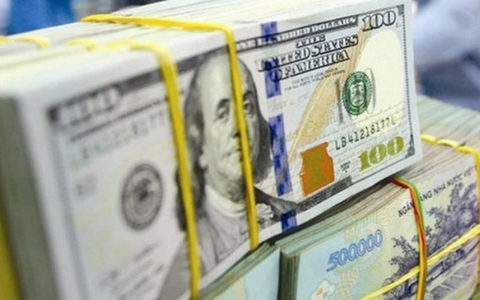The State Bank of Viet Nam (SBV) raised again today the reference USD/VND exchange rate by 8 Vietnamese đồng, taking it to a record high of VND22,101 per US dollar.

This is the highest rate since this year's January launch of the new fixing mechanism, wherein the central bank announces a central reference rate for the dong/dollar each day based on an eight-currency basket and macro conditions.
Compared with earlier this year, the rate rose by 0.96 per cent.
The US dollar has been strengthening against the đồng, both on the official and unofficial markets, after the US presidential election result was announced on November 9.
Currently, commercial banks are allowed to trade the dollar at +/-3% on either side of the reference rate, or between VND21,423 and VND22,749.
Commercial banks today also continuously revised upwards their offering prices, with ACB raising the US dollar prices by 10 đồng against the previous day, both for buying and selling, to trade at VND22,350 and VND22,440 per dollar, respectively.
Vietcombank also increased the rate by 65 dong against Tuesday, listing the rate at VND22,375 and VND22,445 for selling and buying, respectively.
With a rise of 20 đồng for selling against the previous day, Techcombank is currently selling the dollar at the highest rate of VND22,450 each.
In the global market, the US Dollar Index, which tracks the greenback’s performance against six other currencies, climbed 1 per cent to 100 late on Monday in New York, its strongest level since December 2, 2015, according to FactSet data.
The index was on track for its sixth consecutive advance, its longest winning streak since a six-session run in early May.
Dao Van Hung, member of the National Financial and Monetary Policy Consultation Council and director of the Ministry of Planning and Investment’s Policy and Development Institute, attributed the strengthening of the dollar against the đồng to investors betting that US President-elect Donald Trump would favour fiscal stimulus, resulting in higher inflation, and the Fed would likely hike interest rates next month. Meanwhile, dollar demand in the domestic market is high, as local firms need more foreign currencies to pay their import bills at year-end, he said.
Despite the strengthening of the dollar against the dong, Hung said, demand and supply sources of the dollar on the domestic market remain stable, adding that the exchange rate therefore sees no significant pressure.
According to Hung, the impact of the strengthening of the dollar in the global market on Viet Nam’s forex market has not been significant as the opening rates [SD1] of Viet Nam’s financial market are much lower than that of other regional countries.
In addition, compared with the currencies of Việt Nam’s large trade partners, the dollar/đồng exchange rate is currently reasonable and has not had a negative impact on the country’s trade competitiveness, Hung said.
Hung forecast that the domestic forex market would see no significant pressure at year-end thanks to the rising foreign direct investment (FDI) capital in the country and the trade surplus.
In the first 10 months of this year, Viet Nam reported a rise of 7.6 per cent in FDI disbursement, reaching US$12.7 billion, and a trade surplus of $3.2 billion.
The central bank’s flexible reference rate will help minimise the negative impact of global volatility, Hung said, adding that the policy also contributes to dampening speculation in the forex market.
The central bank can also intervene in the market through futures contracts with local commercial banks besides using forex reserves of more than $40 billion - a record high in recent years – to stabilise the forex market. — VNS